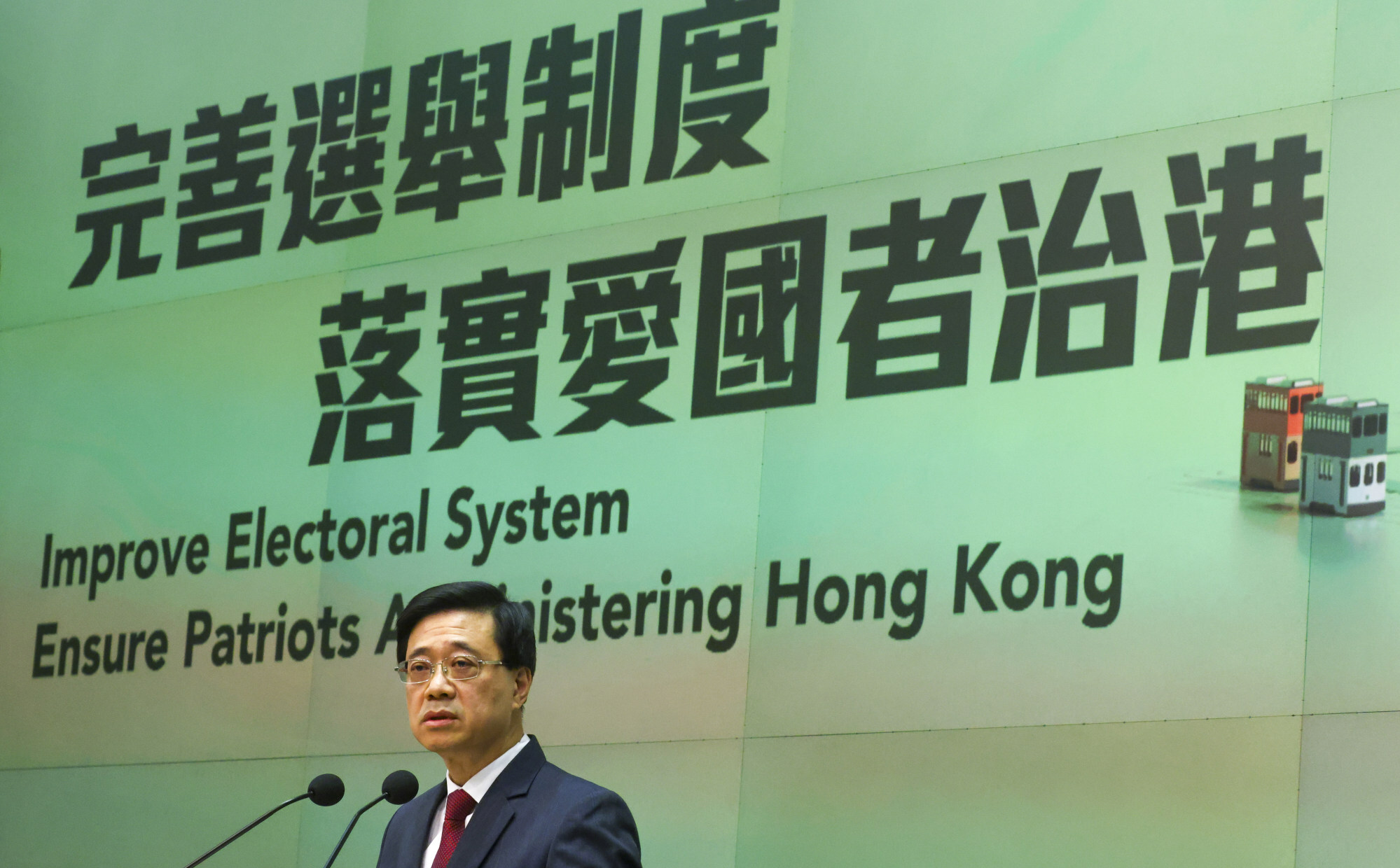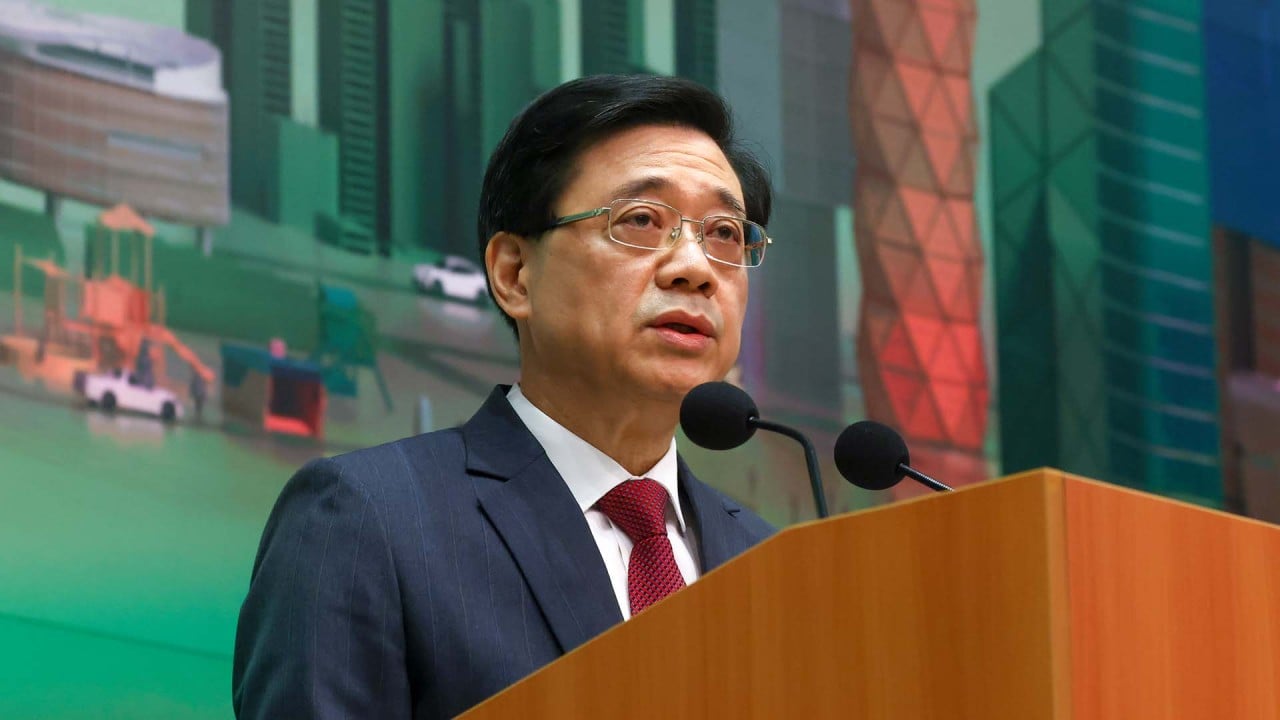
Hong Kong chief executive election 2022: John Lee attracted backers and critics during long climb from police inspector to No 2 official
- Chief Secretary Lee is putting together a team for a possible run at Hong Kong’s top job next month, several sources have told the Post
- While some have previously questioned whether his background fully prepared him for his role as the No 2 official, Lee appears to have secured the support of perhaps the most important constituent of all – Beijing

Becoming chief executive would crown a long career in public service for Lee, who turned 64 last December. He joined the government in 1977 as a probationary inspector in the police force and was promoted to chief superintendent in July 1997, shortly after Britain handed Hong Kong back to China. He was then appointed assistant police commissioner in 2003.
Lee came to wider public recognition in 2006 when he led an investigation into the notorious case of “evil cop” Tsui Po-ko, who killed a policeman and injured a second one during a three-way firefight in a Jordan subway. Tsui himself was shot five times and died at the scene, leaving behind a mystery that took weeks to unravel. It was later revealed that Tsui was responsible for murdering police constable Leung Shing-yan and stealing his gun in 2001 and months later carrying out an armed bank robbery in Tsuen Wan, where he shot dead a security guard.
Lee continued to climb up the police ranks, becoming deputy commissioner in 2010, before being appointed undersecretary for security in 2012 in the Leung Chun-ying administration. When Lam succeeded Leung in 2017, she elevated Lee to secretary for security, a role that put him at the forefront of some of the most challenging times in Hong Kong’s recent history.
John Lee resigns, will be ‘only Hong Kong leadership candidate with Beijing’s blessing’
In September 2018, he banned the pro-independence Hong Kong National Party, marking the first time a political party had been declared unlawful under the Societies Ordinance since the handover.
As protests grew and security deteriorated, Lam sought to de-escalate the situation by announcing in the summer that the bill’s legislative work would be suspended indefinitely, but to no avail. Protesters called for Lam, Lee, Secretary for Justice Teresa Cheng Yeuk-wah and then police chief Stephen Lo Wai-chung to step down, but the government refused to concede to the demand.
In a press conference in August 2019, Lee defended officers’ use of force on protesters, saying they took action when their safety was threatened.
“If there is no attack on police, if there is no use of violence, of course there is no need for police to resort to the use of force,” he said. “You can see petrol bombs being thrown, you can see fire being set, you can see people being dragged out of the car because of opposite views. So this is sowing the sea of terror which I think police must deal with.”
Hong Kong No 2 John Lee’s focus is on national security, not other policies: Lam
In January last year, Lee was asked to explain the legal basis and evidence for arresting about 50 activists over a primary the camp held to whittle down the list of candidates for the approaching Legislative Council election.
“The operation today targets the active elements who are suspected to have been involved in the crime of overthrowing or interfering, seriously destroying the Hong Kong government’s legal execution of duties,” he said. “[Their] plan will result in serious damage to society as a whole. That is why police’s action today is necessary.”
In an unexpected reshuffle of Lam’s de facto cabinet last June, Lee was promoted to chief secretary and police chief Chris Tang Ping-keung moved into the vacancy, while former immigration chief Erick Tsang Kwok-wai was appointed secretary for constitutional and mainland affairs.
Analysts said at the time the promotions by Beijing reflected the central government’s emphasis on law and order and national security, as well as its trust in the loyalty and capability of the heads of the disciplined services. In announcing the moves, Lam said she hoped the appointments would set a good foundation for the next government.

But Hong Kong had never before had a career policeman as its second-most powerful government official and there were concerns Lee lacked the broad policy experience needed to perform as an effective chief secretary, where he would be required to coordinate the work of the many ministers and bureaus that made up the sprawling 180,000-member civil service, in addition to overseeing policy areas such as population and youth development.
Lee also became the chairman of the Candidate Eligibility Review Committee, a newly created seven-member body responsible for ensuring candidates in the city’s major elections posed no threat to national security. The committee disqualified localist lawmaker Cheng Chung-tai, the lone non-establishment voice in Legco after the mass resignation of the opposition camp.
In March last year, as security chief, Lee spoke at a UN Human Rights Council meeting via videoconferencing, saying that since the national security law was enacted in June 2020, there was a reduction in pro-independence activities in Hong Kong, as well as in the number of people arrested over serious and violent crimes.
Hong Kong national security law: 53 held for subversion in biggest crackdown yet
On March 16, Lee delivered a speech at an online side event on Hong Kong-related issues organised by the Chinese mission in Geneva during another session of the Human Rights Council.
On Lee’s strong police background, Hui Ching, research director at think tank the Hong Kong Zhi Ming Institute, said: “Beijing’s choice of having someone with a strong police background as the chief executive will inevitably leave the global business community puzzled as to whether Hong Kong is still positioned as an international finance centre.
“It will inevitably give overseas investors the impression that Hong Kong is more concerned about national security than finance and business.”
Hui added that Hong Kong needed a chief executive “who is willing to listen to different views” instead of a “hardline leader”.

Legislator Tik Chi-yuen, of the middle-of-the-road party Third Side, urged Lee to “engage different sectors of the community more … to persuade others that his strong disciplined services background would not be a hurdle to his governance of Hong Kong”.
Tik had worked with Lee in the Action Committee Against Narcotics when the latter was security minister.
“Some people may think Lee is a very tough and difficult person,” Tik said. “But he is actually rather mild and is willing to listen to others’ views and make concessions if it is for the good of the situation.”
Since taking up the role as No 2, rumours have circulated more than once that Lee was planning on making a run as the next chief executive and it would not be the first time Hong Kong had seen such a step up. Donald Tsang Yam-kuen and Lam each served as chief secretary before taking up the top job. Former chief secretary Henry Tang Ying-yen also contested the leadership race in 2012 but he was defeated by former Executive Council convenor Leung Chun-ying in a divisive election.
Ban of Hong Kong separatist party on ‘compelling’ grounds
This past February, Lee led a delegation to Shenzhen to discuss the worsening pandemic situation with mainland authorities. He continued to serve as head of the Hong Kong delegation in ongoing discussions about the health crisis.
Speculation that Lee was sidelining Lam grew after he told a press conference upon his return from that first trip that the government was naming three bureau chiefs, excluding health minister Sophia Chan Siu-chee, to follow up on a number of tasks that had been agreed with the mainland. The government later issued a lengthy statement to stress Lam had convened another high-level meeting to finalise the division of labour.
The chief executive election opened for nominations on Sunday and hopefuls will have until April 14 to submit their names.
Additional reporting by Tony Cheung


